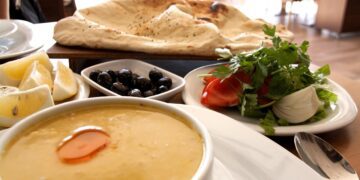Greek cuisine actively weaves a narrative rich in Mediterranean history, culture, and culinary prowess. Directly from the sun-drenched beaches of Kos to the historic grandeur of Rhodes, these islands serve up a flavour palette that has taken the global gastronomic scene by storm, particularly making its mark within Europe. Keep reading to find out interesting food in Greece facts.
Revisiting the Cornerstones of Greek Gastronomy
Olive Oil: Kos’s Exquisite Elixir
The use of olive oil in Greece dates back to ancient civilizations. In Kos, olive oil was considered so valuable that it was often used in religious rituals, as offerings to the gods. Today, this “exquisite elixir” is a staple in the Greek kitchen, an ingredient that’s almost synonymous with Mediterranean life. Kos, known for its particularly fine quality olive oil, boasts olive trees that have been cultivated for generations, producing an oil that’s celebrated for its bright, fruity notes. This essential component of the Mediterranean diet was even traded across ancient Europe, and today continues to be a source of pride for Greece.
Feta: Rhodes’ Culinary Gem
Feta cheese, one of Greece’s most famous exports, has a history as rich as its flavor. On Rhodes, it’s more than just a cheese—it’s a cultural artifact. Feta has been made in Greece for millennia, with records of it dating back to the Byzantine era, where it was praised for its tangy taste and versatility. Protected by a designation of origin status, Rhodian feta is made in a way that honors these ancient methods. From being crumbled over fresh salads to serving as the star ingredient in savory pies, feta is as much a part of the island’s history as its ancient ruins.
Herbs and Spices: The Aromatic Essence of the Dodecanese
The hills and valleys of the Dodecanese islands, including Kos and Rhodes, are dotted with wild herbs that have grown there for thousands of years. These herbs aren’t just used for seasoning—they have been central to life on the islands since ancient times, often employed for medicinal purposes, rituals, and preserving food. Today, these same herbs—oregano, thyme, rosemary, and saffron—are used in cooking, giving a distinctive flavor to dishes. Greeks have always believed in letting the land guide their cuisine, and these herbs, handpicked from their natural environment, bring a burst of history and nature to every meal.
The Anatomy of Greek Dining: Island Edition
Meze: The Heartfelt Welcome
Imagine arriving at a taverna on Kos or Rhodes and being greeted with an array of small dishes, each telling its own story of tradition. This is the spirit of meze. The practice of serving small plates to be shared among friends and family has ancient origins, stemming from the Greek word “meses,” meaning “taste” or “snack.” Meze isn’t just about eating—it’s about connecting, about making time for conversation and savoring each moment. Dishes like dolmades (stuffed grape leaves), tzatziki, and tiropita (cheese pies) are steeped in centuries of tradition, a blend of flavors that reflect the islands’ agricultural roots and coastal bounty.
The Main Event: A Tribute to Land and Sea
Throughout history, the Greeks have made the most of their natural resources, and their cuisine reflects this resourcefulness. Rhodes, as a maritime hub, has always been a meeting point for trade, which brought in not just spices but also culinary ideas from across the Mediterranean. This influence is seen in its seafood dishes like grilled octopus and squid, which have been enjoyed here since the time of ancient seafarers. Meanwhile, Kos, with its fertile lands, has long been known for its lamb and vegetable dishes, using ingredients that are grown or raised locally. Dishes like moussaka or lamb with rosemary have a timeless quality, loved by the ancient Greeks and still cherished by travelers today.
Dessert: The Divine Finale
Ancient Greeks believed in indulging the senses, and dessert was no exception. Sweets like baklava—layers of thin pastry soaked in honey and filled with nuts—can trace their roots back to the Byzantine era. In Kos and Rhodes, honey has always been highly prized, viewed as the nectar of the gods, and it remains a key ingredient in many traditional desserts. Honey from these islands is infused with the flavors of local thyme or pine, giving it a complexity that elevates even the simplest of treats. The tradition of using honey in desserts goes back to ancient fertility festivals and continues to sweeten every meal today.
The Dynamic Evolution of Greek Island Cuisine
From the Earth to the Table: The Freshness Mantra of Kos
In ancient times, Greeks believed that the gods blessed their crops, and today, the philosophy of “fresh is best” is alive and well. On Kos, the farm-to-table movement isn’t just a trend; it’s a way of life that dates back thousands of years. The island’s fertile soils produce some of the freshest fruits, vegetables, and herbs, which have long been at the heart of its cuisine. From farm-direct produce to locally sourced seafood, eating in Kos feels like a direct connection to the earth.
Culinary Progression: Rhodes’s Modern Flair
While Rhodes is steeped in history, its chefs have embraced the future, blending traditional flavors with modern techniques. This isn’t a new concept in Greek cuisine, though—ancient cooks were known to experiment with spices and herbs from trade routes spanning the Mediterranean. Today, that spirit of innovation continues in Rhodes, where chefs push the boundaries by reinterpreting classic dishes with a modern twist. It’s this dynamic fusion of old and new that has positioned Rhodes as a rising star in Europe’s culinary scene.
The Cultural Fabric of Greek Gastronomy
Cuisine as Cultural Expression
Food in Greece has always been tied to ritual, family, and community. In ancient times, meals were offerings to the gods, shared with family and friends as part of religious festivals. Today, that same sense of tradition continues in Kos and Rhodes, where food is more than sustenance—it’s an expression of identity. Whether at a casual taverna or a family feast, every dish carries the weight of history, telling the story of the islands’ past while serving as a bridge to the future.
The Mediterranean Diet: Europe’s Health Paradigm
The Mediterranean diet, often hailed as the epitome of healthy eating, is rooted in ancient Greek practices. In Kos and Rhodes, locals have followed a diet rich in fruits, vegetables, legumes, and olive oil for centuries, and today, science has confirmed its benefits. Studies show that this diet promotes longevity, heart health, and overall wellness, which is why it’s been adopted across Europe and around the world.
Greek Gastronomy’s Worldwide Resonance
From ancient times to today, Greek food has served as a cultural ambassador. The flavours of Kos and Rhodes—bold, fresh, and steeped in tradition—have found their way into kitchens around the globe. Greek restaurants across Europe and beyond showcase the timeless appeal of dishes like moussaka, spanakopita, and baklava, while the Mediterranean diet’s principles of health and wellness have become a worldwide culinary movement. The influence of Greek cuisine continues to expand, spreading the essence of Hellenic culture to new generations of food lovers.
The Eternal Charm of Greek Island Cuisine
The cuisine of Kos and Rhodes is more than just food; it’s a journey through time. From the ancient olive groves to the modern kitchens of innovative chefs, the flavours of these islands have shaped both European and global gastronomy. Visitors don’t just taste the food—they taste history, tradition, and a deep connection to the land and sea. Greece’s culinary story is one of resilience, creativity, and a celebration of life, captured beautifully in every bite.
For an extended voyage into Greek cuisine, consider our next read: “Seafront Restaurants to Love in Ixia, Rhodes.”














